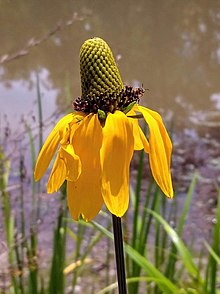Rudbeckia texana
| Rudbeckia texana | |
|---|---|

| |
| Scientific classification | |
| Kingdom: | Plantae |
| Clade: | Tracheophytes |
| Clade: | Angiosperms |
| Clade: | Eudicots |
| Clade: | Asterids |
| Order: | Asterales |
| Family: | Asteraceae |
| Genus: | Rudbeckia |
| Species: | R. texana |
| Binomial name | |
| Rudbeckia texana | |
Rudbeckia texana, commonly known at Texas coneflower or shiny coneflower, is a perennial plant in the family Asteraceae native to the Western Gulf coastal grasslands of Texas and Louisiana.
Description
Rudbeckia texana is a robust perennial growing up to 150 cm (59 in) tall by 30 cm (12 in) wide. It has alternate, mostly basal leaves 9–20 cm long. The leaves have a leathery texture and are elliptic in shape. Flowering stems appear in the spring, each stem terminating with between 1 and 4 composite flower heads. Flowers have a conical shape and are about 2.0–4.5 cm tall, 1–1.5 cm wide with yellow ray florets circling a conspicuous dark brown dome-shaped cone of many small disc florets.[1][2]
Taxonomy
Because of its morphological differences from Rudbeckia nitida, R. texana was elevated from varietal to species level in 1989.[2]
Distribution and habitat
Rudbeckia texana can be found in western Louisiana and eastern Texas, primarily in remnant wet prairies and along railroads and highways.[2][3]
Ecology
Like other members of the genus Rudbeckia, R. texana is likely an important source of pollen for native bees, especially Adrena rudbeckiae.[4] Rudbeckia texana blooms between May and November.[3]
Conservation
The Texas coneflower is sensitive to overgrazing, plowing, and other forms of degradation. It is easily grown from seeds collected in the fall and seeds germinate in 1–2 weeks with no treatment.[3]
References
- ^ Perdue, Jr., Robert E. (1962). "Two new varieties and a new combination in Rudbeckia". Rhodora. 64: 328–329 – via Biodiversity Heritage Library.
- ^ a b c Cox, Patricia B.; Urbatsch, Lowell E. (1989). "Rudbeckia texana, a taxon worthy of specific status (Asteraceae: Heliantheae". Phytologia. 67: 366–367 – via Biodiversity Heritage Library.
- ^ a b c "Rudbeckia texana". Guide to the Plants of Louisiana. United States Geologic Survey.
- ^ Owens, Brittany E.; Allain, Larry; Van Gorder, Eric C.; Bossart, Janice L.; Carlton, Christopher E. (2018). "The Bees (Hymenoptera: Apoidea) of Louisiana: An Updated, Annotated Checklist". Proceedings of the Entomological Society of Washington. 120 (2): 272–307. doi:10.4289/0013-8797.120.2.272. S2CID 135413580.
External links
- Rudbeckia texana Lady Bird Johnson Wildflower Center Native Plant Database
